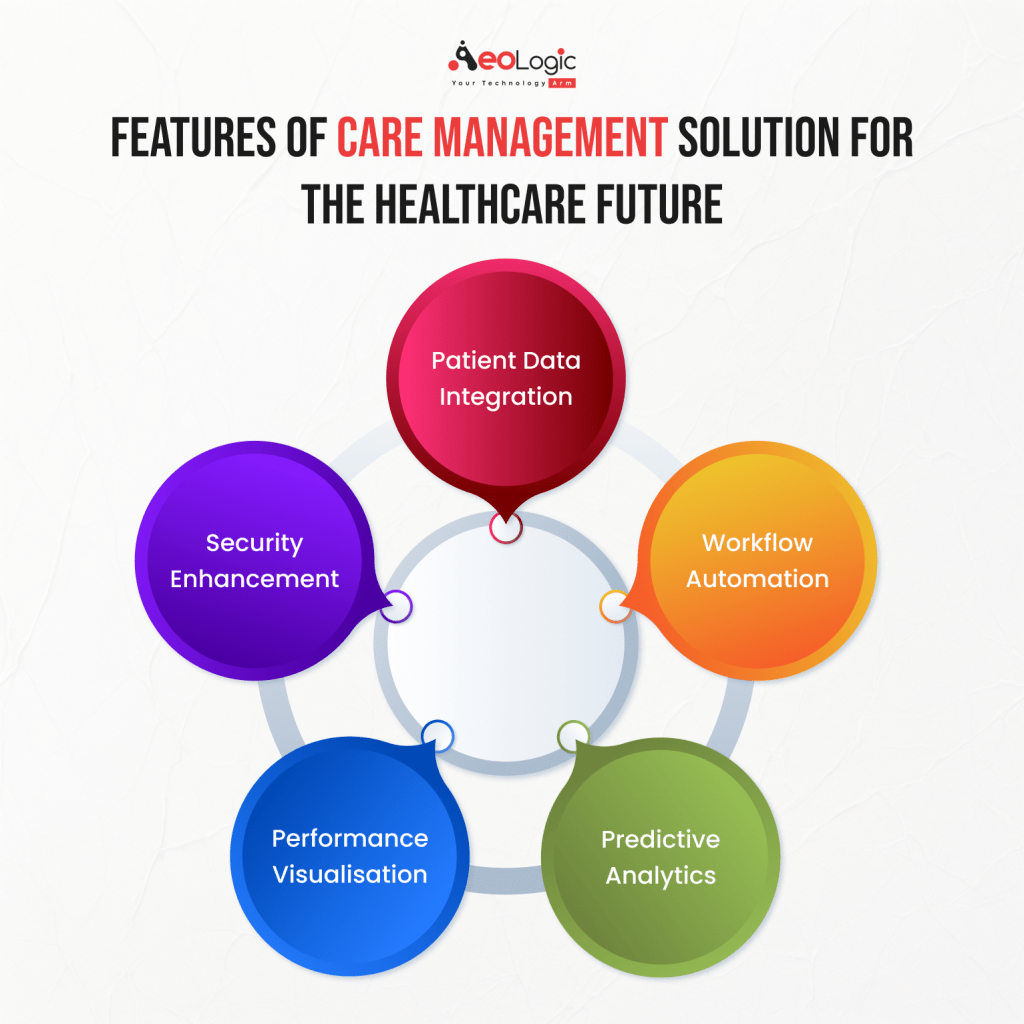The Healthcare industry is well established as it is very important for human life. This industry is not just about mankind’s welfare but also has a good global market size and developed in the last few years very significantly. The healthcare services market size has grown strongly in recent years. It will grow from $8,348.44 billion in 2023 to $8,963.64 billion in 2024 at a compound annual growth rate (CAGR) of 7.4%. The healthcare services market size is expected to see strong growth in the next few years. It will grow to $10,908.99 billion in 2028 at a compound annual growth rate (CAGR) of 5.0%.
However, with the development and digitalization of the world, the healthcare industry also needs to develop its way of treating patients and care management techniques. You can see that there are many problems too in healthcare organizations such as delays in treatment due to lack of information or paperwork, improper diagnosis, etc. There are care management solutions that can play a significant role in enhancing the healthcare industry. The global care management solution market is estimated at US$ 19.54 billion in 2024 and is projected to expand swiftly at a CAGR of 17.7% to reach US$ 99.85 billion by 2034. This care management industry will make a big impact in various industries as well as the healthcare industry.
Care management solutions can enhance the healthcare industry in various ways as with AI-driven analytics, telemedicine, and remote patient monitoring. Hospital administrators can improve clinical outcomes, optimize resource allocation, and improve care delivery by incorporating these technologies into their daily operations. There are many technologies other than care management solutions that have been implemented in the healthcare industry and also provided good outcomes.
In this article, we will see the role of trends in care management solutions in the healthcare industry. We will also see some examples of care management solutions that can revolutionize the healthcare industry in various ways. At last, we will conclude the details that we will mention in the article.
What Are Care Management Solutions For Healthcare?
Care management-based solutions’ main aim to Improve patient health status is one of the many objectives as it is defined as a collection of therapeutic services intended to help a patient and his or her support system manage medical disorders and the behavioral and social issues that may result from them. Care management-based solutions can validate medical necessity and efficiently coordinate patient care throughout the path to recovery. Overall, the healthcare industry needs care management solutions to take patient care to a new height.
How Trends In Care Management Solutions Can Enhance The Future Of The Healthcare Industry?
Care management-based solutions are nothing more than a collection of healthcare practices that work to enhance patient care by integrating care systems to lower the demand for medical services and assist patients and caregivers in controlling their health problems.
All of this is accomplished by encouraging participation via phone calls, in-person meetings, online conferences, and automatic reminders. Patients with acute care, chronic conditions, specific risk factors, and condition management benefit most from this as this helps them to take treatment via their comfort zone.
Various care management solutions trends could benefit the healthcare industry. We will see some features of care management solutions in the upcoming paragraph.
Also Read: Custom Kiosk Software Development Solutions For Healthcare Industry
Features Of Care Management Solution For The Healthcare Future

There are Various features of care management solutions that could revolutionize the healthcare industry. Here are a few key features mentioned below.
Patient Data Integration
Data and information about patients are very important as they tell the patient’s past medical history. It is not easy to store every patient’s data on paper. With advanced care management solutions, the healthcare industry or organization can consolidate medical records, history, and treatment plans into one accessible platform, eliminating data silos. This overall gives clarity to the doctor about the patient’s condition as they have every past, and present information of the patient.
Workflow Automation
Automation is another feature of care management solutions as many administrative tasks are repetitive and time-consuming. This could lead to delays in patients’ treatment. With the proper care management-based solutions, automation can be achieved with the involvement of technology like AI, etc. This enhances the administrative processes and reduces delays in patients’ treatment.
Predictive Analytics
Many trends in care management solutions offer predictive analytics with the help of Artificial intelligence. This helps the healthcare organization to analyze historical data to anticipate and prevent negative health outcomes using machine learning. If there is proper analytics then it could be easy to decide on the treatment. This also enhances the treatment processes without taking too much risk.
Performance Visualization
With the proper care management solutions, the healthcare industry can track its performance when performance is high and when low. This could help them to strengthen their weak points. Care management solutions track and display provider performance to aid in clinical improvement efforts. Gradually, this tool enhances the performance of the healthcare industry in every aspect.
Security Enhancement
The healthcare industry also consists of vast amounts of patient data that could be confidential. If that data could be handed over to the wrong hands then that could be misused. This also affects the healthcare organization’s reputation. With the proper care management solutions, the security of the system is enhanced. This also increases the trust of patients in the organization which overall made a good impact on the organization’s reputation too.
Also Read: How AI in Healthcare Improves Patient Care in 2024?
Trends In Care Management Solutions for Future Healthcare
Machine-Learning Algorithms
Machine learning in healthcare is the most important trend for care managers to keep an eye on. MI algorithms can organise and prioritise patients by assessing complicated characteristics such as hospitalisation, patient history, socioeconomic determinants, medications, and so on. MI in care management allows carers to identify patients at higher risk and deliver more comprehensive care.
Multichannel Care Management
Telehealth’s growth was exponential in 2020, opening up new perspectives and care management opportunities. Virtual care, as a subset of telehealth, may develop at a 22% CAGR, reaching $20 billion by 2027. When a chronic patient at risk is unable to access the traditional route of care, care management with a focus on longitudinal monitoring and digital tools such as virtual and RPM technologies becomes crucial.
The American Heart Association (AHA) considers RPM as a subcategory of telehealth. RPM uses technology to aggregate and understand physiological patient data, hence improving the effectiveness of care management.
Increases Usage of Care Management
In Care Management, keep an eye out for home health and trends. Advanced care management have been in place for some time, but the whole business model is changing. Progressive care management organisations and providers are addressing the chronic care management journey by providing a seamless continuum of care at home.
Home healthcare is becoming more holistic and personalised. In reality, the pandemic has redirected patients’ concerns away from skilled nursing facilities and towards proper home health care assistance for post-acute and long-term care.
Care Management Efficacy
The tendency is to automate workflows and use IDP (Intelligent Document Processing). Using intelligent automation technology, assisted and unassisted automated activity is used to streamline administrative components of care management, such as retrieving patient lists, setting reminders, confirming appointments, and delivering reports to various care management teams and members. 
Technology Used for Care Management Solutions
IoT Technology
It has enhanced people’s chances of survival, particularly among the elderly. IoT solutions assist in tracking patient performance and implementing corrective measures for care management staff. Hospitals that have various IoT-enabled devices have transformed into digitised healthcare management hospitals by intelligently connecting equipment and systems to make targeted conceptualised decisions.
Care management is up its game by leveraging the potential of drone technology. This also speeds up sample collecting from remote places, assuring a steady supply of medicines, emergency supplies, life-saving drugs, and so on. In fact, IoT-based drone technology is a time-saver.
Big Data
Big Data is causing a fundamental shift in care management. Big Data allows specialists to collect and analyse data from many sources that would otherwise be complex. Big Data enables the storage of large amounts of data, which can then be analysed and recovered. It also helps to change existing data that care management can use. Big Data enables accurate strategic decision-making. One of the best instances of big data is genome sequencing technology, which necessitates faster processing of massive amounts of information.
Also Read: The Role of AI in Revolutionizing Fitness App Development
Challenges With The Growing Trends In Care Management Solutions
With a lot of features provided by trends in care management, there are also some challenges. Here are some common challenges mentioned that could be faced with most technologies.
-
- The initial cost of implementation is always a key challenge with any technology as it applies to care management solutions too.
-
- Big data and cybersecurity issues can be a major challenge with care management solutions. It is a tough task to manage vast amounts of data and maintain proper cybersecurity to avoid data breaches.
-
- Still, many people avoid the use of technology in the healthcare system as they have trust issues when it comes to life. So it will take time to make people aware of the use of care management solutions in the healthcare industry.
Also Read: Why Is Digital Transformation Important In The Healthcare Industry?
Final Words
Care management systems are essential to contemporary healthcare because they foster efficiency, teamwork, and patient-centered care. They are supporting continued initiatives to raise patient satisfaction, lower costs, and improve healthcare outcomes. It can increase overall care quality, decrease medical errors, and improve patient outcomes.
By providing a single platform, it helps hospitals to improve communication, automate repetitive tasks, and manage their operations. We have seen various features that have the potential to improve the many aspects of a healthcare organization. There is just a need to make people and healthcare organizations aware of the care management solutions trends that enhance this vital industry.








